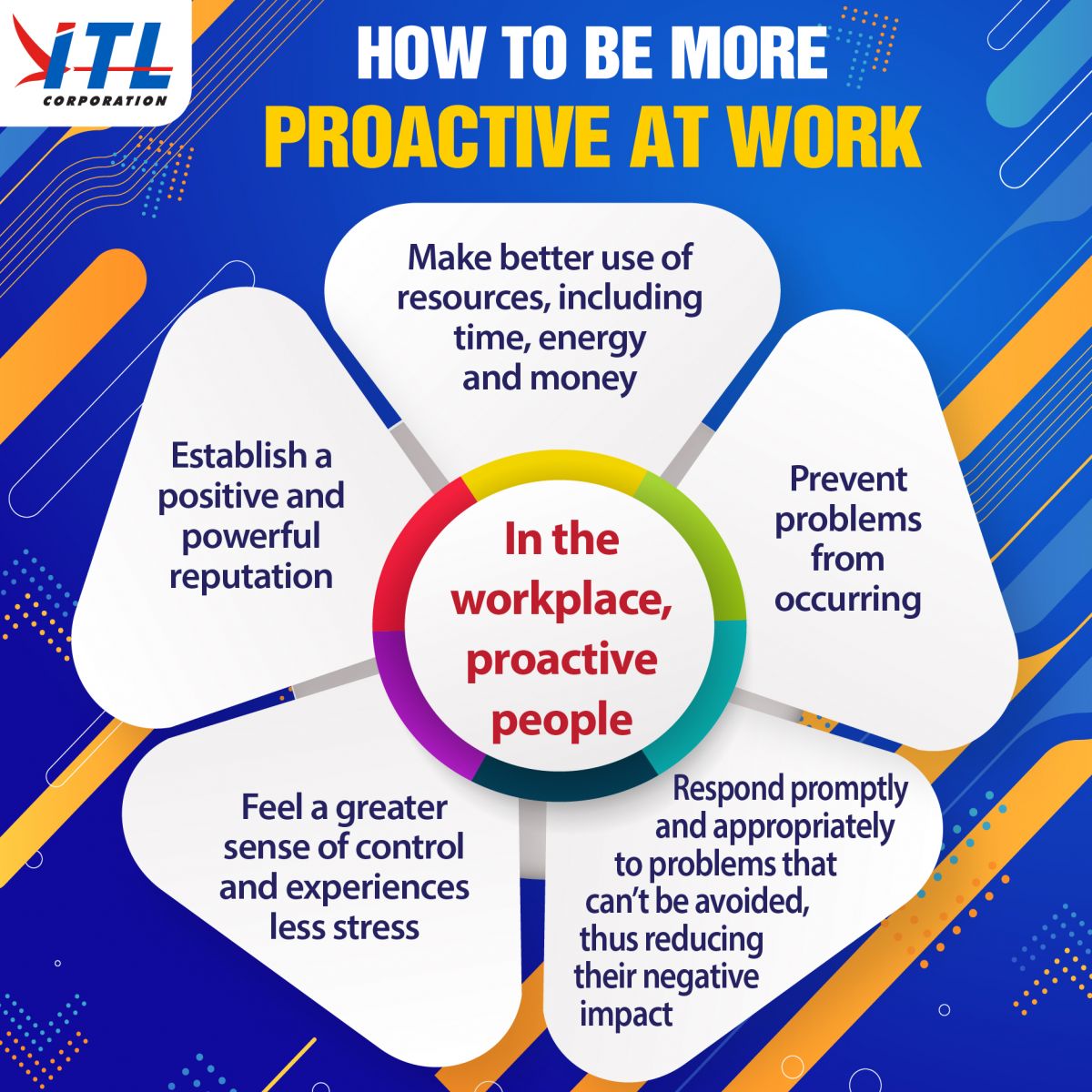06
07/21
How To Be More Proactive At Work
What being proactive means?
According to the Merriam-Webster dictionary, being proactive means “acting in anticipation of future problems, needs, or changes”. Being proactive means thinking about the future and focusing on the things you can control instead of all those you cannot. It also means taking responsibility.
A proactive mindset starts with realizing that you’re not a product of your circumstances, but your decisions. The proactive mindset is often intertwined with the growth mindset. If you have a growth mindset, you don’t give up when you face a challenge, you persist; You don’t see failures as a bad thing, but the opportunity to grow; You are inspired by the success of others instead of envious; Your goal is to continuously grow and improve yourself.

What are the advantages of being proactive at work?
The first thing that being proactive at work will help in your career is the clarity of goals and expected results. With this information at hands, professionals remain productive by being able to plan and execute tasks, while guiding the decision-making process with a focus on results.
The ability to plan and anticipate possible interferences allows better organization and execution of the proposed tasks. In addition, proactivity encourages people to leave their comfort zone, which is always encouraged in ITL.
In the workplace, proactive people:
- Make better use of resources, including time, energy, and money
- Prevent problems from occurring
- Respond promptly and appropriately to problems that can’t be avoided, thus reducing their negative impact
- Feel a greater sense of control and experiences less stress;
- Establish a positive and powerful reputation.
How to be more proactive at work?
As with any other skill, proactivity can be developed. All you need is dedication to do so!
Below, we’ve listed a few tips to help you stay proactive:
Self-awareness
Knowing how to identify your strengths is important in order to use them in your favor. Understand which skills you can put into practice to help you develop a project. Also, don’t forget to identify the points you need to improve. As we’ve mentioned, searching for new skills and constant improvement is key for a proactive professional.
Plan
Always plan. Make a list of your daily tasks and those that a particular project might require. Analyze how much time on average you’ll take to carry out each one of these tasks and specify deadlines. Planning will help you have a clearer picture of a project’s scope, in addition to helping you achieve the expected results.
Decision-making
Decision-making is part of every professional’s daily activities. The difference is that a proactive professional is better prepared to reach successful outcomes.
But how do you ensure that you are doing everything in your power to make the right decision? Study.
Keep in mind that being proactive is only one of the things that can help you boost your career. It’s also essential to know how to manage your own time and organize yourself so as not to leave tasks and decisions for later.
According to the Merriam-Webster dictionary, being proactive means “acting in anticipation of future problems, needs, or changes”. Being proactive means thinking about the future and focusing on the things you can control instead of all those you cannot. It also means taking responsibility.
A proactive mindset starts with realizing that you’re not a product of your circumstances, but your decisions. The proactive mindset is often intertwined with the growth mindset. If you have a growth mindset, you don’t give up when you face a challenge, you persist; You don’t see failures as a bad thing, but the opportunity to grow; You are inspired by the success of others instead of envious; Your goal is to continuously grow and improve yourself.

What are the advantages of being proactive at work?
The first thing that being proactive at work will help in your career is the clarity of goals and expected results. With this information at hands, professionals remain productive by being able to plan and execute tasks, while guiding the decision-making process with a focus on results.
The ability to plan and anticipate possible interferences allows better organization and execution of the proposed tasks. In addition, proactivity encourages people to leave their comfort zone, which is always encouraged in ITL.
In the workplace, proactive people:
- Make better use of resources, including time, energy, and money
- Prevent problems from occurring
- Respond promptly and appropriately to problems that can’t be avoided, thus reducing their negative impact
- Feel a greater sense of control and experiences less stress;
- Establish a positive and powerful reputation.
How to be more proactive at work?
As with any other skill, proactivity can be developed. All you need is dedication to do so!
Below, we’ve listed a few tips to help you stay proactive:
Self-awareness
Knowing how to identify your strengths is important in order to use them in your favor. Understand which skills you can put into practice to help you develop a project. Also, don’t forget to identify the points you need to improve. As we’ve mentioned, searching for new skills and constant improvement is key for a proactive professional.
Plan
Always plan. Make a list of your daily tasks and those that a particular project might require. Analyze how much time on average you’ll take to carry out each one of these tasks and specify deadlines. Planning will help you have a clearer picture of a project’s scope, in addition to helping you achieve the expected results.
Decision-making
Decision-making is part of every professional’s daily activities. The difference is that a proactive professional is better prepared to reach successful outcomes.
But how do you ensure that you are doing everything in your power to make the right decision? Study.
Keep in mind that being proactive is only one of the things that can help you boost your career. It’s also essential to know how to manage your own time and organize yourself so as not to leave tasks and decisions for later.
How do you show you are proactive at work?
- Don’t wait for feedback, actively seek it. That shows a desire to learn and improve
- Provide timely updates to your boss, your team, your clients, or whoever it may concern
- Don’t be afraid to ask questions if you have any, not only that you’ll do your job better because everything will be clear, but you’ll also show that you’re proactive
- Be active in meetings; Give suggestions, participate in brainstorming sessions, share your opinions and help other team members.
*Source: blog.hotmart.com/ clockify.me
- Provide timely updates to your boss, your team, your clients, or whoever it may concern
- Don’t be afraid to ask questions if you have any, not only that you’ll do your job better because everything will be clear, but you’ll also show that you’re proactive
- Be active in meetings; Give suggestions, participate in brainstorming sessions, share your opinions and help other team members.
*Source: blog.hotmart.com/ clockify.me














